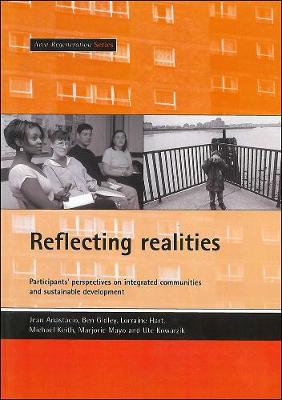Area Regeneration
2 total works
Reflecting realities
by Jean Anastacio, Lorraine Hart, Michael Keith, Marjorie Mayo, Ute Kowarzik, and Ben Gidley
Published 21 July 2000
Government rhetoric increasingly emphasises the importance of community participation in area regeneration programmes; however, it is far less clear how much those involved are able to effectively influence practice and future policy making. Community knowledge is an important resource; participants need to be actively involved in monitoring and evaluation at every stage of the regeneration process.
Through analysis of four case study areas with a history of participation and interviews with community representatives and key stakeholders, Reflecting realities explores participants' perspectives on:
participation structures;
capacity building and the technical and professional support available;
systems for monitoring and evaluating regeneration programmes.
It also considers:
the impact of the diverse nature of communities on involvement;
the difficulty in truly representing 'community' opinion;
the pressure of competing for scarce resources;
the wider role of the community and voluntary sector.
The report concludes with recommendations for national and regional government, local authorities and community organisations, as well as providing notes on the good practice highlighted throughout the report.
Reflecting realities can be read independently or alongside Auditing community participation - the practical workbook for the evaluation of community involvement - which was developed from the same research (The Policy Press/Joseph Rowntree Foundation, 2000). The reports are essential reading for all those involved in community-led regeneration groups, policy makers, local authorities and regional and national government, as well as anyone with an interest in community-led regeneration practice.
Through analysis of four case study areas with a history of participation and interviews with community representatives and key stakeholders, Reflecting realities explores participants' perspectives on:
participation structures;
capacity building and the technical and professional support available;
systems for monitoring and evaluating regeneration programmes.
It also considers:
the impact of the diverse nature of communities on involvement;
the difficulty in truly representing 'community' opinion;
the pressure of competing for scarce resources;
the wider role of the community and voluntary sector.
The report concludes with recommendations for national and regional government, local authorities and community organisations, as well as providing notes on the good practice highlighted throughout the report.
Reflecting realities can be read independently or alongside Auditing community participation - the practical workbook for the evaluation of community involvement - which was developed from the same research (The Policy Press/Joseph Rowntree Foundation, 2000). The reports are essential reading for all those involved in community-led regeneration groups, policy makers, local authorities and regional and national government, as well as anyone with an interest in community-led regeneration practice.
Training and Education for Urban Regeneration
by Paul Henderson and Marjorie Mayo
Published 1 October 1998
The importance of systematically examining the training agenda of urban regeneration is now a priority for government. The picture is currently fragmented and highlights the need for a national framework to set the context for training provision at regional, city and neighbourhood levels. This study addresses the following issues: What is the need for training in area-based regeneration? What kind of training is needed?What are the gaps in current training provision and what are the constraints facing training providers?What are the barriers to people taking up training opportunities?Do existing networks play a role in the exchange of information and skills? Could the role they play be enhanced?In answering these questions, Training and education in urban regeneration provides an overview of current training provision and future need in the context of urban regeneration. Residents and members of community groups were interviewed, along with professionals working in regeneration areas, and policy makers and managers. A range of experiences and perspectives is reflected in their responses, including those of women and ethnic minority communities.If regeneration programmes are to be effective, sustainable and empowering for local communities, then policy makers and professionals, as well as community members, need training to work effectively in partnerships. This report is therefore essential reading for all those involved at the national level (central government), regional level (Regional Development Agencies and Government Offices for the Regions), and those at city level (training providers, including organisations and agencies concerned with professional education and training, local authorities and the voluntary and community sectors).

